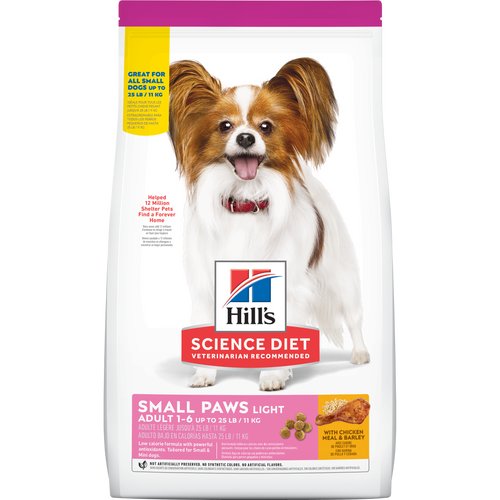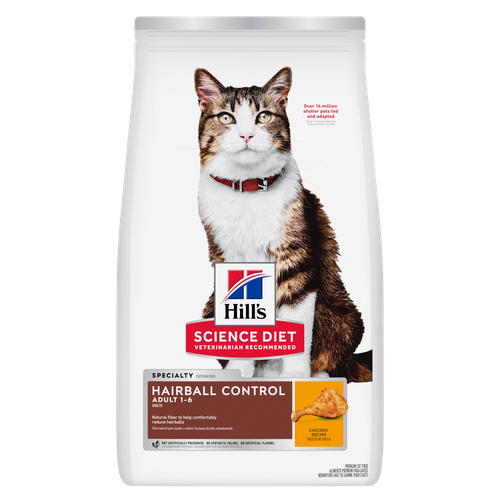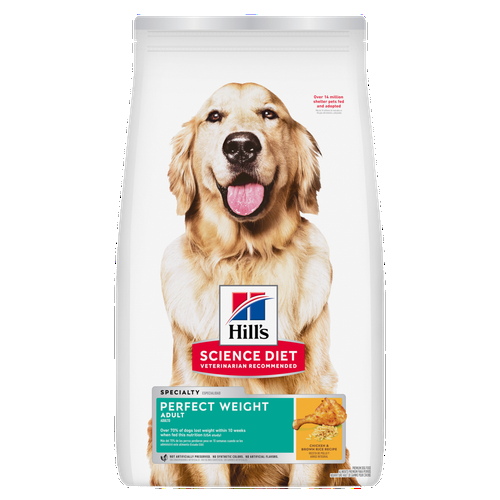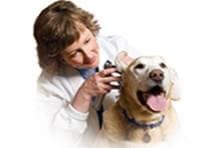
-
Find the right food for your petTake this quiz to see which food may be the best for your furry friend.Find the right food for your petTake this quiz to see which food may be the best for your furry friend.Featured products
 Adult Perfect Digestion Salmon, Whole Oats, and Brown Rice Recipe Dog Food
Adult Perfect Digestion Salmon, Whole Oats, and Brown Rice Recipe Dog FoodScience Diet's breakthrough nutrition supports ultimate digestive well-being & healthy microbiome
Shop Now Hill's Science Diet Adult Oral Care Chicken, Brown Rice & Barley Recipe Dog Food
Hill's Science Diet Adult Oral Care Chicken, Brown Rice & Barley Recipe Dog FoodClinically proven kibble technology to reduce plaque & tartar build-up
Shop Now Adult Light Small Paws with Chicken Meal & Barley Dog Food
Adult Light Small Paws with Chicken Meal & Barley Dog FoodLow calories for less active small & mini dogs
Shop NowFeatured products Adult Hairball Control Chicken Recipe Cat Food
Adult Hairball Control Chicken Recipe Cat FoodNatural fiber to help comfortably reduce hairballs
Shop Now Adult 7+ Chicken Recipe cat food
Adult 7+ Chicken Recipe cat foodSupports energy level and beautiful fur in mature cats
Shop Now Adult Perfect Weight Chicken Recipe Dog Food
Adult Perfect Weight Chicken Recipe Dog FoodOver 70% of dogs lost weight within 10 weeks when fed this nutrition (USA Study)
Shop Now -
Dog
- Dog Tips & Articles
-
Health Category
- Weight
- Food & Environmental Sensitivities
- Urinary
- Digestive
- Joint
- Kidney
-
Life Stage
- Puppy Nutrition
- Adult Nutrition
- Senior Nutrition
Cat- Cat Tips & Articles
-
Health Category
- Weight
- Skin & Food Sensitivities
- Urinary
- Digestive
- Kidney
-
Life Stage
- Kitten Nutrition
- Adult Nutrition
Featured articles Keeping Pets Calm During Thunderstorms
Keeping Pets Calm During ThunderstormsIs your dog scared of thunder? Does your kitty dart under the bed at the first rumble? Learn a few tips for keeping your pets calm during the storm.
Read More How to Reduce Your Pet's Carbon Paw Print
How to Reduce Your Pet's Carbon Paw PrintHeaded outside? How you and your pets engage with nature can affect the environment, so here are some quick tips for reducing your pet's carbon paw print.
Read More Moving With a Pet: A How-To Guide
Moving With a Pet: A How-To GuideDiscover helpful tips for moving with your pet including safety recommendations to keep in mind on moving day & pet behavior to watch for at your new home.
Read More -


The ear is divided into four parts:
- Pinna - the part outside the head
- External ear canal
- Middle ear - found on the inside of the eardrum
- Inner ear - consists of tubes and nerve structures that transmit sound to the brain. The inner ear also helps control your dog’s balance.
Ear inflammations are common in dogs and have many causes. Dogs, like bloodhounds, with droopy ears and/or a great deal of hair, like the English sheepdog, in the ear canal seem to have the most problems with ear inflammations. These characteristics plus the warm and enclosed nature of the ear canal provide an excellent environment for infectious agents that cause inflammation.
Causes
Bacteria, fungi and ear mites are common causes of ear inflammation in dogs. Allergies, seborrhea, an underactive thyroid gland, trauma, foreign objects (such as plant seeds) and tumors also cause ear inflammation.
Most cases of middle ear and inner ear inflammation are caused by bacteria that pass through a ruptured eardrum. One cause of a ruptured eardrum is overzealous cleaning of the ear canal. Throat infections may also cause middle ear inflammations.


Tasty Tips
Diagnosis by your Veterinarian
Examination of your dog’s ear canal and eardrum by your veterinarian with an instrument called an otoscope helps determine the cause. If the ear is very painful, your dog may need to be sedated for a thorough exam. Other tests include: microscopic examination of earwax; ear cultures; thyroid hormone studies; X-rays; surgical biopsy.
Most ear inflammations can be treated successfully once appropriate diagnostic tests are completed by your veterinarian.
Treatment and Home Care
Ear issues must be treated persistently and specifically, depending on the diagnosis. In some cases, treatment may need to be continued for six weeks or longer.
In most cases your veterinarian will need to clean your dog's ear and remove the hair from the ear canal before treatment will be effective. The use of medications to dry your dog’s ears can be helpful. More aggressive treatment, such as surgery, may be recommended for severe cases.
Home care usually includes administering medications directly into your dog’s ear canal according to your veterinarian’s instructions. Failure to properly administer ear preparations could lead to chronic inflammation, so be sure to follow your veterinarian’s recommendations.
Nutrition
If your dog has an ear issue, your veterinarian may suggest a change in your dog’s food. In some cases, your veterinarian may recommend a therapeutic hypoallergenic dog food to help limit exposure to potential allergens. Such dog foods may include Hill’s® Prescription Diet® brand dog foods.
Unless recommended otherwise by your veterinarian, gradually introduce any new dog food over a seven-day period. Learn how to transition your dog gradually to a new dog food.


One of our staff authors prepared this article for you
Related products

Low calories for less active small & mini dogs

Clinically proven kibble technology to reduce plaque & tartar build-up

For the unique nutritional needs of mature Small & Mini Dogs

Science Diet's breakthrough nutrition supports ultimate digestive well-being & healthy microbiome
Related articles

Your dog's coat and skin are a big part of your dog's overall health. Ensure you keep your dog's coat healthy, by following these simple tips.

Proper nutrition for your pregnant or nursing dog is vital to her and her puppy's health. Learn what you should do provide her with the proper nutrients.

Understand the role that Omega-6 and Omega-3 fatty acids play in your dog's overall health, and how you can ensure they are getting enough.

Learn about Hill's puppy food and the nutritional benefit & high quality ingredients that it contains for your pup.

Put your dog on a diet without them knowing
Our low calorie formula helps you control your dog's weight. It's packed with high-quality protein for building lean muscles, and made with purposeful ingredients for a flavorful, nutritious meal. Clinically proven antioxidants, Vitamin C+E, help promote a healthy immune system.
Put your dog on a diet without them knowing
Our low calorie formula helps you control your dog's weight. It's packed with high-quality protein for building lean muscles, and made with purposeful ingredients for a flavorful, nutritious meal. Clinically proven antioxidants, Vitamin C+E, help promote a healthy immune system.

